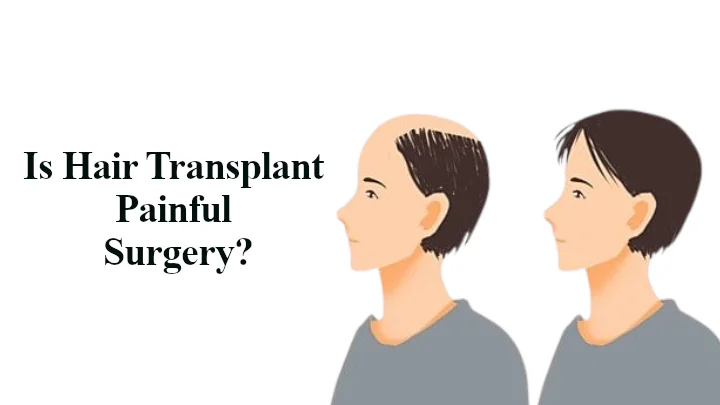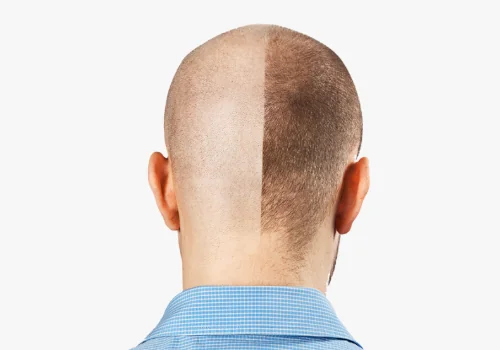Is Hair Transplant Painful Surgery?

Looking for Is Hair Transplant Painful? Hair transplant surgery is a popular choice for many people who want to restore their hair. However, a common concern is whether the procedure is painful.
This article will address this question in simple terms, discussing what happens before, during, and after the surgery to give you a clear understanding of what to expect.
What is a Hair Transplant?

A hair transplant is a surgical procedure where hair follicles are moved from one part of the body (usually the back or sides of the head) to the balding or thinning areas.
There are two main types of hair transplant methods: Follicular Unit Transplantation (FUT) and Follicular Unit Extraction (FUE).
Preparing for the Surgery
Before the procedure begins, the surgeon will talk to you about what to expect. They will likely give you instructions to follow, such as not taking certain medications that can increase bleeding. This preparation helps ensure that the surgery goes smoothly.
During the Surgery
1. Anesthesia
The first step in the surgery is administering anesthesia. The surgeon will use a local anesthetic to numb the area where they will remove and transplant the hair follicles.
This means you will be awake during the procedure, but you should not feel pain. Some patients feel a slight sting or pinch when the anesthesia is injected, but this is generally brief.
2. The Procedure
In an FUT procedure, the surgeon removes a strip of scalp from the donor area. The scalp is then stitched up, and the strip is divided into tiny grafts.
In an FUE procedure, individual hair follicles are extracted directly from the donor area. Both methods aim to place the hair grafts into tiny incisions in the recipient area.
During this process, you should not feel pain due to the anesthesia. However, you might feel some pressure or a tugging sensation as the surgeon works. This is usually not uncomfortable and is a normal part of the surgery.
After the Surgery
1. Immediate Post-Surgery
Once the surgery is over and the anesthesia wears off, you may start to feel some discomfort. The scalp can be tender, and you might experience some soreness.
Pain levels vary from person to person, but it is generally mild and can be managed with over-the-counter pain medication like ibuprofen or medications prescribed by your doctor.
2. Healing Process
In the days following the surgery, you might notice some swelling and redness around the treated areas. This is a normal part of the healing process.
Your surgeon will provide instructions on how to care for your scalp, including how to wash your hair and what activities to avoid.
Most people find that any discomfort diminishes significantly after a few days. It is important to follow your surgeon’s aftercare instructions to ensure a smooth recovery.
Long-Term Effect
1. Sensitivity
In the weeks after the surgery, your scalp may be sensitive. Some people experience a feeling of tightness or tingling as the nerves heal. This is usually temporary and should improve as your scalp continues to recover.
2. Itching
As the healing process continues, it is common to experience itching. It is important not to scratch your scalp as this can disrupt the healing process and affect the final results of the transplant.
Your surgeon may recommend a special shampoo or medication to help manage itching.
Pain Management Tips
If you are concerned about pain, there are several steps you can take to manage it effectively:
- Follow Instructions: Carefully follow all pre- and post-surgery instructions given by your surgeon.
- Take Medication: Use any prescribed pain medications as directed to manage discomfort.
- Stay Hydrated: Drinking plenty of water can help your body heal.
- Rest: Give yourself time to rest and avoid strenuous activities in the days following your surgery.
- Gentle Care: Be gentle when washing your hair and avoid touching the treated areas unnecessarily.
Conclusion
While the idea of surgery can be intimidating, most people find that hair transplant procedures are not particularly painful. The use of local anesthesia ensures that you do not feel pain during the surgery, and any post-operative discomfort is usually mild and manageable with medication.
By following your surgeon’s advice and taking good care of your scalp, you can help ensure a smooth and comfortable recovery. If you have any concerns or questions about the procedure, do not hesitate to discuss them with your surgeon.





